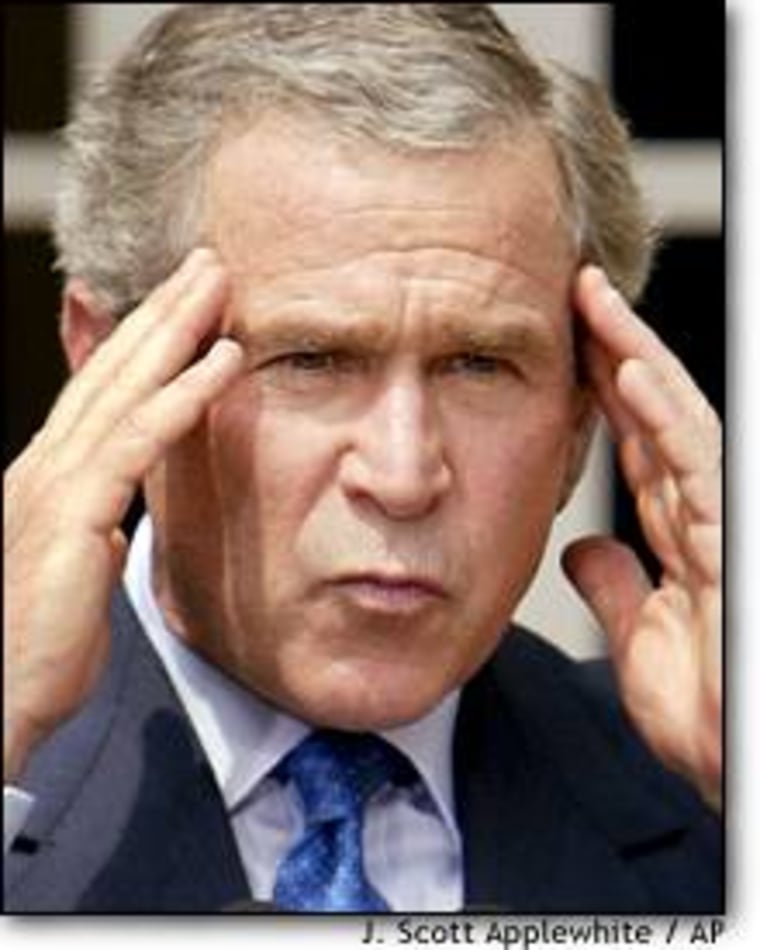This cannot be the holiday President Bush desired. Bush has decamped to Crawford, Texas for a month-long respite from what has become a summer of discontent, marked by troubles in Iraq, an anemic job market and assorted mullahs, mea culpas and media outlets bedeviling him.
Riding comfortably, if somewhat lower, in national opinion polls, the president plans to raise a bit of re-election money during his Texan repose, but his official schedule includes little else.
Yet with attacks on American troops in Iraq continuing, with new controversy swirling over the handling of intelligence before Sept. 11, 2001 and the Iraq war, and with both of his arch enemies — Saddam Hussein and Osama bin Laden — still walking the earth, one wonders how much sleep, let alone rest, the president gets.
It has been a very busy summer, by Washington’s normally sleepy standards.
“I keep waiting for the dog days of summer to start,” a State Department official told MSNBC.com Wednesday. “But we haven’t seen any dogs around here for about two years now.”
After several unsuccessful efforts in recent weeks to inoculate his presidency from charges that he misled the American public into the Iraq war, Bush channeled Harry Truman on Wednesday, declaring “I take personal responsibility for everything I say, of course.” That, plus a month of relative isolation from the baying hounds of the Washington press corps, his aides hope, should allow the administration to move on.
No less a figure than former President Bill Clinton urged the nation to do just that recently, saying that being president invariably means making mistakes. “The thing we ought to be focused on is what is the right thing to do now,” Clinton said on CNN’s Larry King show.
Bush may have understandable qualms about relying on Clinton to bolster his credibility. But there are many on both sides of the political aisle here who think he needs to take the issue of credibility more seriously.
“Sixteen words, 45 minutes, 28 pages,” says Ray Tanter, a former Reagan administration national security aide. “Those numbers are not going away.”
Tanter, a conservative activist who specializes in Middle East policy, was referring to the three numbers that are bedeviling the administration at the moment:
the 16 now discredited words on Iraq’s efforts to buy uranium in Africa in Bush’s state of the union address;
the 45 minutes British intelligence alleged, apparently without evidence, that it would take Iraq to deploy its weapons of mass destruction;
the 28 classified pages in the joint congressional report on the 9/11 attacks which describe Saudi Arabia’s alleged financial ties to the Sept. 11 hijackers — pages the president refuses to release in spite of the pleas of the Saudi government.
“Bush’s numbers are going down two polling points a week recently,” Tanter notes. “and even if the world is a better place without Saddam’s regime — and I think it is — you can’t afford to be complacent about your credibility.”
Accentuate the negative?
It is common wisdom around the capital these days that the Democrats cannot defeat Bush simply by hoping for the worst. “We can’t sit around hoping that, if Iraq comes apart or turns into a meat grinder, people will suddenly turn on Bush,” says a Democratic senator who declined to be identified.
Indeed, few believe that Bush’s political fortunes will suffer solely because of the exaggerated claims made about Saddam’s alleged weapons of mass destruction.
But there is more, potentially, to the credibility issue than Saddam and his elusive arsenal. In the wake of the latest revelations about American intelligence failures ahead of the 9/11 attacks, however, there are increasing questions being asked about the administration’s commitment to fixing the problems that allowed a terrorist organization which had publicly avowed to attack and kill Americans to go undetected as it set up an infrastructure to do just that on American soil.
“No one blames Bush for 9/11,” says a senior Republican Party official. “But there is a risk … a danger, maybe a better word … that people will blame this administration if a second attack shows that we didn’t learn from the first one.”
Connecting dots
Officials and lawmakers involved in reviewing intelligence collection since 9/11 continue to worry that parochial concerns for turf and budgets are preventing the reforms that appear to be needed at America’s most important intelligence agencies, the CIA, the Defense Intelligence Agency, the National Security Agency and the FBI. The administration’s official position, to date, is that 9/11 was not the result of intelligence failures. While senior officials, including FBI Director Robert Mueller and CIA Director George Tenet, have admitted before congress to things that might have been handled better, both also acknowledged that not a single agent or official had been demoted or reprimanded as a result.
A presidential commission continues to investigate the myriad issues exposed by 9/11. The pre-Iraq war behavior of intelligence agencies and the senior policymakers who are their main customers is not the main thrust of the commission’s inquiries. But the commission, headed by New Jersey’s former Republican Gov. Thomas Kean and former Democratic Rep. Lee Hamilton of Indiana, is supposed to assess the ability of the United States to prevent such an attack from happening again, not merely to reveal more about what was wrong in 2001. As such, the enormous shortcomings of pre-war intelligence on Iraq, along with the high-level dissembling and finger-pointing of recent weeks, is considered germane, according to an official close to the commission.
The commission is due to issue its report in May 2004, smack in the middle of an election year. The Bush administration, meanwhile, once again this week issued a warning of a credible terrorist threat possibly involving the hijacking of commercial aircraft in the United States or Europe. None of which, it might be safely assumed, is conducive to a good night’s sleep in Crawford.
